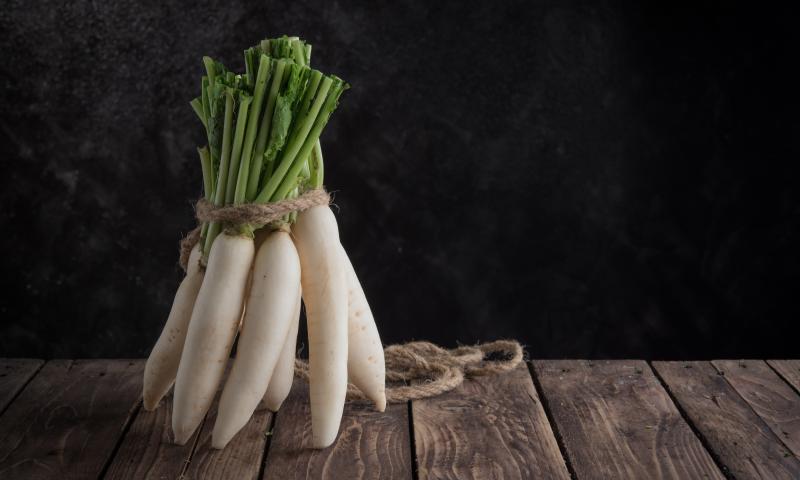 />
/>
Botanical Characteristics:
Scientific Name: Raphanus Sativus
Family: Brassicaceae
Daikon, also known as the white radish or winter radish, is a root vegetable that is native to Southeast and East Asia. Morphologically, daikon boasts a long, cylindrical shape that tapers to a point. Its skin is smooth and ranges in color from white to pale green, while its flesh is crisp, juicy, and stark white. Mature daikon radishes can grow up to 20 inches in length and 4 inches in diameter, although the size can vary significantly depending on growing conditions.
Chemical Composition:
Daikon is a rich source of vitamins, minerals, and phytonutrients:
Vitamins: Particularly rich in vitamin C, daikon also contains moderate amounts of vitamin A, and some B-complex vitamins like riboflavin, niacin, and folate.
Minerals: Daikon provides minerals such as potassium, magnesium, calcium, and phosphorus.
Phytonutrients: It contains various antioxidants and active enzymatic compounds, including myrosinase, which is believed to have anti-inflammatory properties.
Historical Facts:
Daikon's history is deeply rooted in ancient Asian civilizations. Archeological findings suggest that radishes, including daikon, were cultivated in Southeast Asia over 2,000 years ago. Its cultivation later spread to China, Korea, and Japan. By the 17th century, radishes had made their way to Europe, but the long white variety, daikon, became especially popular in East Asia.
Over time, daikon has been used not only as a food source but also in traditional medicine and cultural practices. For instance, in Japan, pickled daikon (known as takuan) is a staple side dish, while in Korea, it's an essential ingredient in the fermented vegetable dish, kimchi.
Taste:
Daikon has a mild and crisp taste with a slight peppery kick, especially when consumed raw. Its flavor is less pungent compared to smaller radishes. When cooked, daikon's peppery taste mellows out, and it takes on a sweeter, more subtle flavor, reminiscent of cooked turnip or parsnip.
General Health Benefits:
Daikon offers several health benefits:
Digestive Aid: Daikon contains enzymes like amylase, protease, and lipase that assist in breaking down carbohydrates, proteins, and fats respectively, aiding digestion.
Detoxifying Properties: Rich in vitamin C and other antioxidants, daikon can help in detoxifying the body and fighting free radicals.
Bone Health: Being a good source of calcium, daikon can contribute to bone health.
Hydration: Thanks to its high water content, daikon can be a hydrating snack, especially in hot climates.
Indications for Use:
Daikon can be a beneficial addition to the diet for:
- Those looking to increase their intake of dietary fiber, promoting regular bowel movements.
- Individuals aiming for weight management, given its low calorie and high water content.
- People seeking to enhance their daily intake of essential vitamins and minerals.
Conclusion:
Daikon, with its rich history and myriad of benefits, stands out as a versatile and nutritious vegetable. Whether consumed raw in salads, pickled for an umami-packed side dish, or cooked in soups and stews, this humble root vegetable has earned its esteemed position in global cuisines.
